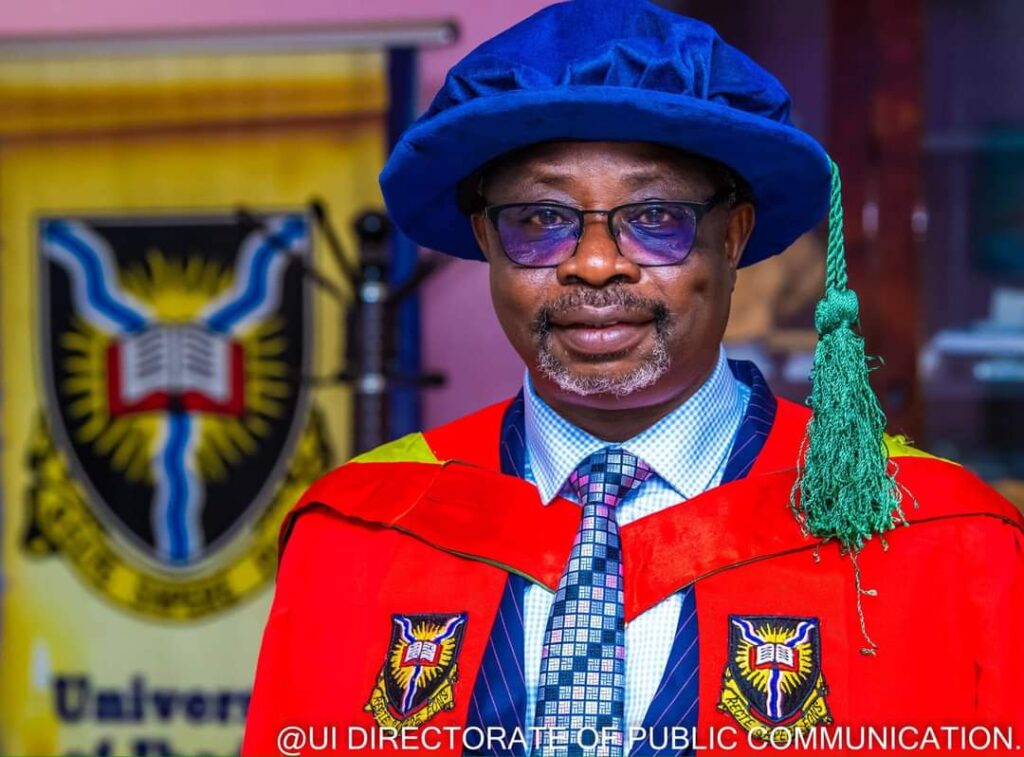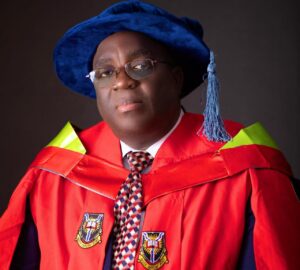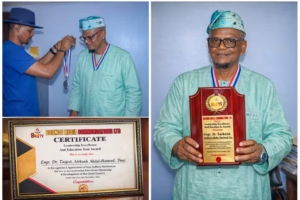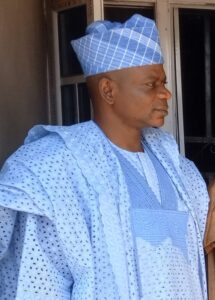
The topic of his inaugural lecture was somewhat sensational: “Working in the Shadows of Death”. The presentation was equally not only terrifying, but mesmerizing as the multitude in attendance and those watching online stayed enchanted till the end of the lecture. It was not deliberately intended to be so fearsome, but indeed it was the reality of his scholarly enterprise.
Professor of Forest Engineering, Ayodeji Oludare Omole, unarguably is one of the prominent Professors at the University of Ibadan. In fact, he is the only academic staff at UI who is also a Pro-Chancellor and Chairman of Governing Council of another University-Ladoke Akintola University of Technology, LAUTH, Ogbomoso. This is in addition to his current status as Head of Department, Forest Production and Products, Faculty of Renewable Natural Resources. He is also a one-time Chairman of Academic Staff Union of Universities (ASUU), UI branch, among other notable positions he has held.
Interestingly, this probably explained why his inaugural lecture was not only unique in many respects, but crowd-pulling as multitude came from far and near, not only to solidarize with the man of the people, but to also listen to a scholar who has been walking and working in the shadows of death in all his scholarly endeavours.
Delivering the 561 lectures at the popular Trenchard Hall of the University, it was clear that Prof. Omole did not exaggerate the tittle. He has actually been applying his knowledge both in the coven of the devil, and theorizing in the shadows of death. Otherwise, how does one explain a situation in which this scholar must perform elaborate rituals and sacrifices to appease the spirits and to ask for forgiveness before cutting down a tree for experiment in his laboratory? In his words, “This process often involves consulting a priest to interpret and determine appropriate offerings!”.
“There is a belief that those who cut down certain trees without observing traditional practices may suffer mysterious accidents, such as the tress falling in an unexpected direction or the chainsaw malfunctioning. These incidents are attributed to the displeasure of the spirits or the tree’s inherent power. Some loggers believe that seeing certain animals, such as owls, giant rats or snakes near a tree (to be cut) is a bad omen. If such signs appear, it is considered a warning from the spirits, and the tree should not be logged, as it may bring misfortunes. To counteract the potential negative effects of logging, some loggers do carry protective charms or talisman believed to be potent enough to shield them from harm and appease the spirits associated with the forest”.
For example, according to Prof. Omole, “One of the revered trees in Yoruba culture is the Iroko tree (Milicia excelsa) which is believed to be the dwelling place of a powerful spirit called “Oluwere”. This tree is seen as a guardian of the community, and cutting down an Iroko tree is believed to be capable of bringing misfortune, madness, or even death to those who commit the act. Cutting down a Baobab tree is seen as severing ties with the ancestral spirits, leading to social and spiritual disarray. Cutting down tree indiscriminately is believed to be disrupting the balance of nature and violate spiritual laws; leading to various forms of misfortune, including environmental degradation and loss of biodiversity.
Prof. Omole hinted that, “There are tales of individuals who cut down sacred trees and suffered dire consequences, such as being haunted by spirits, experiencing personal tragedy, or bringing calamity to their community”, adding that, in Yoruba mythology, the cutting down of trees in sacred places is a profound act that goes beyond the physical destruction of nature. He stressed that the reverence for sacred trees reflects the deep respect the Yoruba people have for their environment and the belief in the interconnectedness of all things.
“However, education, religion, modernization, science and the forces of global capitalism have largely tampered with these myths in Africa in general and Nigeria in particular. It is in this, in a contemporary scientific context that my scholarship as a Forest Engineer is rooted and what I have done in this regard is the subject matter of this inaugural lecture”, he stated.
Forest Engineering is a specialized discipline which focuses on the design, construction and management of infrastructure and technologies used in forestry. It integrates the principles of civil, mechanical and environmental engineering with forestry science to address the unique challenges associated with sustainable management and utilization of forest resources. Key areas include Forest Road Design and Construction, Harvesting System and Techniques, Erosion Control and Watershed Management, Forest Operations Management, and Safety and Risks Management. Forest Engineering principles with environment stewardship to support the sustainable management of forest resources, ensuring that forests continue to provide ecological, economic and social benefits for humanity.
The inaugural lecturer explained that Forest Engineering and Utilization of logging waste, municipal Tree Management and utilization of urban wood, wood mechanics as well as wood protection were his areas of his research focus which he said centered on a better understanding of the efficiency of wood exploitation problems and associated damages in tropical forests. Prof. Omole who took the audience through the historical trajectory of the discipline with its benefits to humanity, listed the hazards associated with logging operations which he said ranged from the falling of dead branches hidden under dense canopy, unexpected collapse of hollow trees, and neighboring trees that were entangled with woody climbers being pulled down as trees fall.
According to him, “The accidents and health risks during logging activities cause heavy loss of capital, lives and property, with little attention being paid to their occurrence in developing countries like Nigeria. His words, “Many forest workers employed in manual or motor-manual operations suffer from back, neck, chest and stomach pains due to whole body vibrations which are the main reasons for early retirement”
On the trees in UI, Prof. Omole noted that these trees were important assets which have long been admired for their roles in the beautification of the university landscape, stressing that, apart from the fact that these trees are of great cultural and social value to the community, they also have historical significance, pointing out that the municipal trees on the campus require special care and maintenance just like any other public property.
Sadly, Prof. Omole lamented that forestry practice in Nigeria in recent times has become endangered due largely to widespread incidences of attacks, killings, raping and kidnapping for ransom by armed men, who are allegedly foreigners and their local collaborators who have taken over many of our forest estates in Nigeria.
On his community service, Prof. Omole said “My excursion into the forest of unionism exposed me to many things about the University system in Nigeria. The system is under siege and therefore ‘Working in the shadows of death’. If nothing drastic is done to stop the various attacks from the government and its agencies, the system will die faster than anticipated. The University system is captured and has been held hostage by many government policies, especially since the advent of the so called ‘civil rule’.
He recommended that, ‘Federal and State governments should follow the UI and Faculty of Renewable Natural Resources’ rehabilitation efforts to restore the Awba dam watershed ecosystem. Allocating funds for forestry can support reforestation and afforestation, restoring ecosystem functions and increasing forest cover. Financial institutions should support these initiatives to mitigate climate change, improve food security, and increase prosperity and employment as a way of fulfilling the UN mandate of meeting the Sustainable Development Goals (SDG) agenda 2030 and attain “Working in the shadows of Life”.
The lecture was as interesting as it was mind-blowing, with appreciative audience punctuating it with intermittent applause. Among the dignitaries on the occasion were Oyo state governor, Engr. Seyi Makinde, who was represented by his Deputy, Bayo Lawal, Vice Chancellors of LAUTECH, Prof. Rasaq Olatunde Rom Kalilu, Emmanuel Alayande’s, Prof. Olanrewaju Olaniyan, who was represented by his Deputy, Prof. Olatunde Salawu, Abiola Ajimobi First Technical University’s, Prof. Sola Ajayi and his Deputy, Prof. Iyiola Tella.
They also included, ASUU President who was represented by Prof. Sunny Ighalo, University of Lagos, Dean of Social Science, Prof. Adelaja Odutola Odukoya, Oyo state commissioner for Works, Prof. Dahud Sangodoyin, Commissioner for Educatrion, Prof. Misbau Babatunde, Commissioner for Youth and Sport, Hon. Wasilat Adegoke, Commissioner for Culture and Tourism, Dr. Wasiu Ajani Olatubosun. Also in attendance were Owa of Ogbaji land, Oba Victor Ojo Adetola and The Onpetu of Ijeru land, Ogbomoso, Oba Sunday Oyediran among others.







